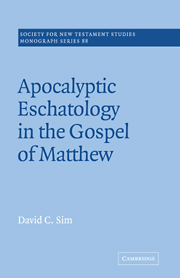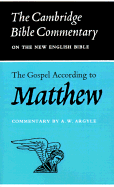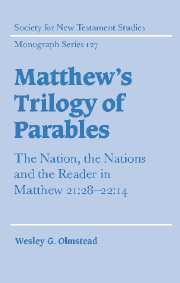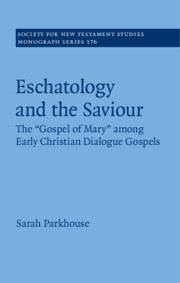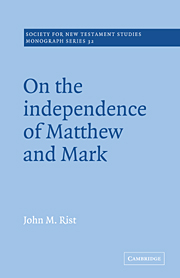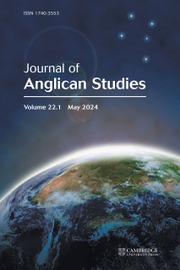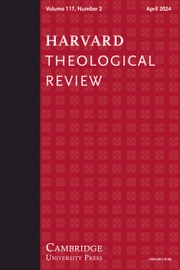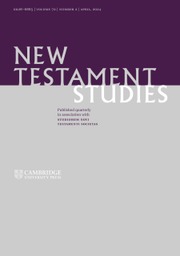Apocalyptic Eschatology in the Gospel of Matthew
$63.99 (C)
Part of Society for New Testament Studies Monograph Series
- Author: David C. Sim, Australian Catholic University, Brisbane
- Date Published: October 2005
- availability: Available
- format: Paperback
- isbn: 9780521020633
$
63.99
(C)
Paperback
Other available formats:
Hardback, eBook
Looking for an examination copy?
This title is not currently available for examination. However, if you are interested in the title for your course we can consider offering an examination copy. To register your interest please contact [email protected] providing details of the course you are teaching.
-
This study reconstructs the apocalyptic eschatology in Matthew's Gospel so we may understand his time and concerns. Sociological analysis of apocalypticism in Judaism and early Christianity shows that such a world view is adopted by a minority group in a time of great crisis. Matthew's distinctive and often vengeful vision must be set against his community's conflict with Judaism, Gentiles and the larger Christian movement and his acute need to enhance his community's sense of identity and out of pastoral concern.
Read more- First comprehensive reconstruction of Matthew's Apocalyptic Eschatology in English
- Interprets this aspect of Matthew's Gospel in the light of contemporary eschatological literature
- Offers a comprehensive sociological explanation for Matthew's adoption of this vision of reality
Reviews & endorsements
"To demostrate that MAtthew thoroughly shares the worldview of apocalyptic eschatology (although his work is not an apocalypse), S. usefully identifies eight characteristics common to apocalyptic eschatology in Jewish and Christian texts: dualism, determinism, eschatological woes, the appearance of a savior figure, judgement, fate of the wicked, fate of the righteous, and expectation of the imminent end. The first two help form the conceptual framework of apocalyptic eschatology, and the other six are widely occuring eschatological themes. S. helpfully identifies the repeated occurence of these characteristics in Matthew, drawing many comparisons with other apocalyptic eschatological literature, notably Revelation, teh Qumran literature, and the Enochic literature." Kathleen Weber, The Catholic Biblical Quarterly
Customer reviews
Not yet reviewed
Be the first to review
Review was not posted due to profanity
×Product details
- Date Published: October 2005
- format: Paperback
- isbn: 9780521020633
- length: 304 pages
- dimensions: 215 x 138 x 18 mm
- weight: 0.406kg
- availability: Available
Table of Contents
Part I. Apocalyptic Eschatology and Apocalypticism:
1. The major characteristics of apocalyptic eschatology
2. The social setting of apocalypticism and the function of apocalyptic eschatology
Summary of Part I
Part II. Apocalyptic Eschatology in the Gospel of Matthew:
3. Dualism and determinism in Matthew
4. Eschatological woes and the coming of the Son of Man
5. The judgement in Matthew
6. The fate of the wicked and the fate of the righteous in Matthew
7. The imminence of the end in Matthew
Summary of Part II
Part III. The Social Setting of the Matthean Community and the Function of Apocalyptic Eschatology in the Gospel of Matthew:
8. The social setting of the Matthean community
9. The function of apocalyptic eschatology in the gospel of Matthew
Summary of Part III
Conclusions.
Sorry, this resource is locked
Please register or sign in to request access. If you are having problems accessing these resources please email [email protected]
Register Sign in» Proceed
You are now leaving the Cambridge University Press website. Your eBook purchase and download will be completed by our partner www.ebooks.com. Please see the permission section of the www.ebooks.com catalogue page for details of the print & copy limits on our eBooks.
Continue ×Are you sure you want to delete your account?
This cannot be undone.
Thank you for your feedback which will help us improve our service.
If you requested a response, we will make sure to get back to you shortly.
×
